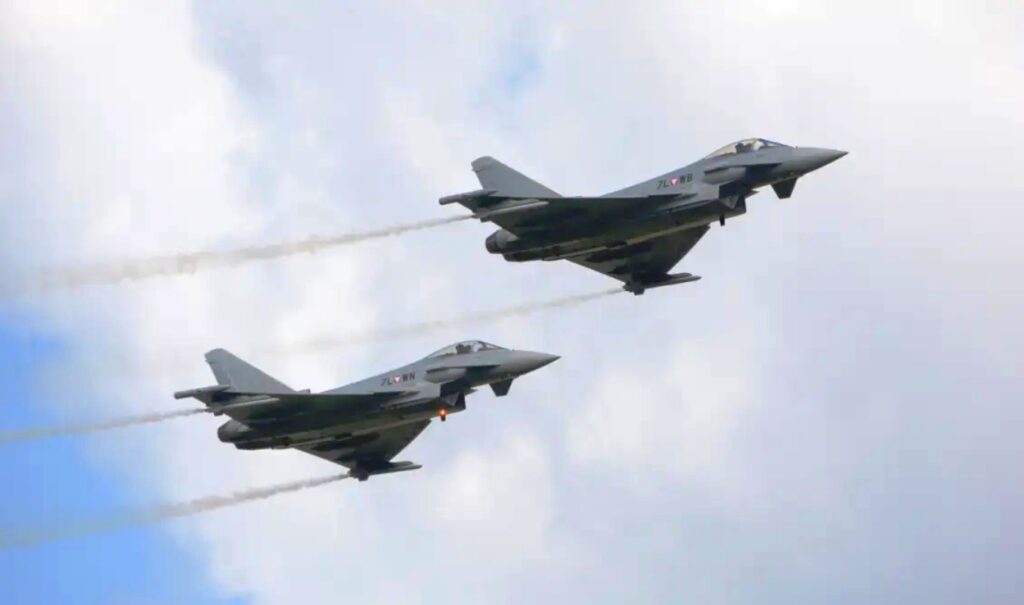While the Greek government announces a series of initiatives against indirect Turkish threats through diplomatic channels, the neighboring country attempts to undermine Greek-Turkish issues by demonstrating its power to both the EU and NATO.
Read: Turkey arms itself with Eurofighters from Britain and Germany – What it means for Greece
Greece’s “response,” through the publication of Maritime Spatial Planning maps, the delineation of maritime blocks for exploitation in the South Aegean and Ionian seas, and the announcement of Marine Parks, has mobilized Turkey, while Greece’s allies primarily examine the satisfaction of their own pursuits, with Putin’s Moscow as a vigilant nightmare on their pillow.
Greek-Turkish relations: How Ankara’s Eurofighter deal changes the geopolitical game
From this perspective, the article by Giuseppe Spatafora is of great interest, as he is a top former NATO official and currently a research analyst at the European Union Institute for Security Studies (EUISS). His article is published in the Turkish news agency Anadolu and extensively discusses the reasons why Turkey appears strategically strong and necessary today for both the EU and NATO.
The author argues that the “radical change in operational cooperation between Turkey and Europe” was sealed on July 23 when Turkish Defense Minister Yasar Guler and British Defense Minister John Healey signed an agreement in Istanbul regarding Turkey’s procurement of Eurofighter Typhoon fighter jets. The significance of this agreement is highly symbolic, as it involves a consortium of the United Kingdom, Germany, Italy, and Spain – three of the most powerful forces in the Old Continent.
Three reasons for the strategic scenario change
According to the author, there are three reasons explaining the change in the Western strategic scenario toward Turkey: “The Russian invasion of Ukraine created distance between Moscow and Ankara, with the latter supporting Ukraine with unmanned aircraft. Relations between Turkey and other NATO countries have improved since Ankara stopped its opposition to Sweden’s Alliance membership. Finally, the very unstable situation in the Middle East increased incentives for Ankara and other European capitals to cooperate to secure NATO’s southern flank,” notes G. Spatafora.
Turkey’s upgraded role is also attributed in the article to Europeans’ continued uncertainty regarding the outgoing US government’s commitments to European defense, while there is a given perception that President Donald Trump’s second term is favorable toward Turkey, and even expects the lifting of the F-35 supply ban. The same favorable scenario emerged with Germany’s government change, which overturned Olaf Scholz’s staunch opposition to Eurofighter sales, mainly due to fears that Turkey could use them against Greece. Friedrich Merz’s government “agreed to lift its veto, due to improvements in Turkish-Greek relations and Ankara’s agreement to use the fighters only within NATO framework and the need to strengthen Europe’s defense cooperation,” claims the Italian analyst.
Within this environment, Turkey attempts to fill the gap left by the withdrawal of US military presence in Europe. Characteristically, 20,000 American soldiers have been stationed in Poland since 2022, when the war in Ukraine began. Their withdrawal now leaves the Turkish army as a natural substitute, being NATO’s second-largest force, making Turkey a valuable ally.
Additionally, Europe’s armament plan strengthens Turkey’s defense industry. As stated in the article, “for the Turkish defense industry, which increasingly exports to the European market (in 2024 total defense material exports reached $7.15 billion, increased by 29% from 2023), it would be vital to secure as large a share of this market as possible.”
The only obstacles that author and analyst Giuseppe Spatafora foresees in Turkey’s further strengthening as one of the powerful US replacements in Europe and essential EU partners are the unresolved Cyprus issue and recurring tensions with Greece.




